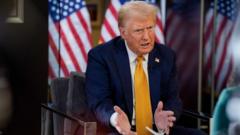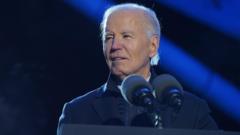As the election approaches, Kamala Harris is rallying major celebrities like Barack Obama, Beyoncé, and Taylor Swift to attract voters, particularly younger ones. However, her strategic shift toward the political center raises concerns among progressives about potential voter alienation.
Star Power Boosts Harris as Election Day Approaches

Star Power Boosts Harris as Election Day Approaches
With Election Day looming, Kamala Harris enlists celebrity support to energize her base, but risks alienating progressives.
With less than two weeks until Election Day, Vice President Kamala Harris is leveraging the allure of prominent celebrity endorsements to mobilize support for her campaign. Notably, she is expected to appear alongside major figures such as Barack Obama and musician Bruce Springsteen at an upcoming rally in Georgia, followed by a high-profile event with Beyoncé in Texas.
These influential endorsements are particularly aimed at younger voters, a demographic where Harris has faced challenges in maintaining enthusiasm levels. The support of Beyoncé and Taylor Swift, who recently endorsed Harris after a pivotal presidential debate, is seen as pivotal in securing engagement from millennial and Gen Z voters.
However, Harris's strategy has drawn criticism from some factions within her party. As her campaign tacks toward the political center, targeting wealthier, college-educated white voters—some of whom may have voted Republican in the past—there are rising concerns about the potential impact on her appeal to progressives and working-class voters. Many Democrats fear that this move may disconnect her from the very base that propelled her political career, risking a waning excitement amongst young and progressive voters who constitute a vital voting bloc.
As Election Day on November 5 approaches, the dynamic between celebrity support and strategic political positioning will play a crucial role in determining Harris's success. The coming days will indeed test whether her celebrity endorsements can effectively offset the risk of alienation among core party constituents.




















